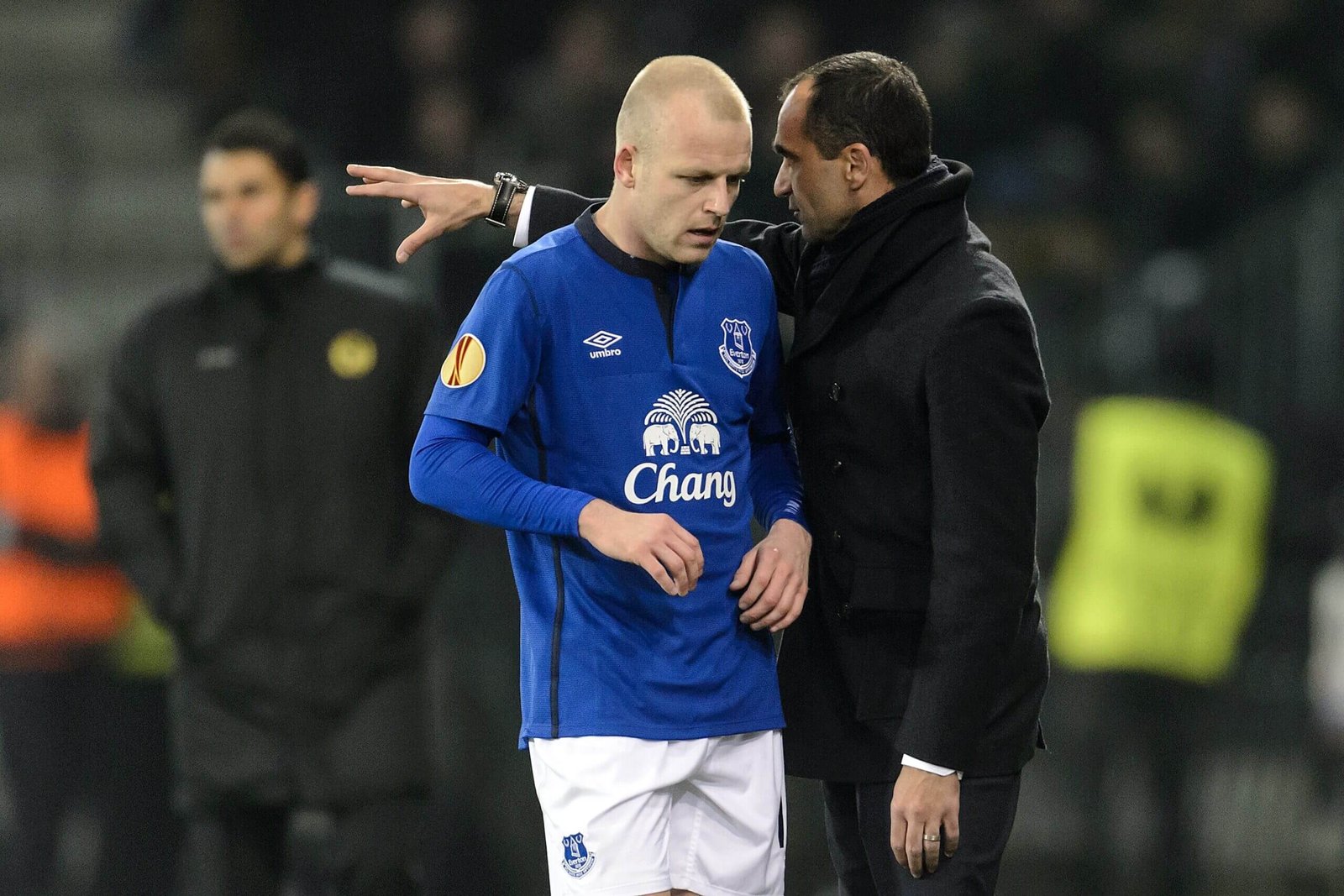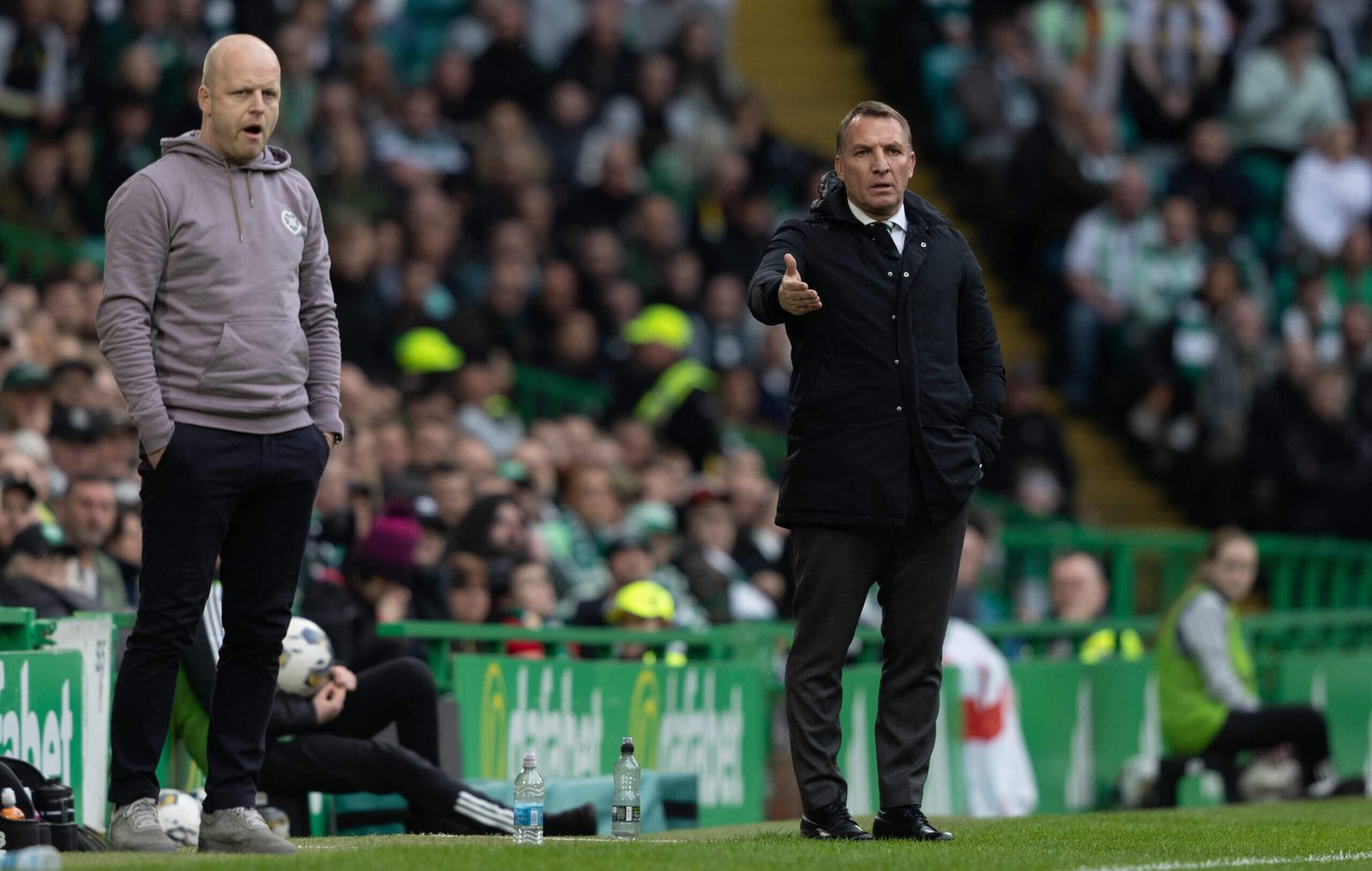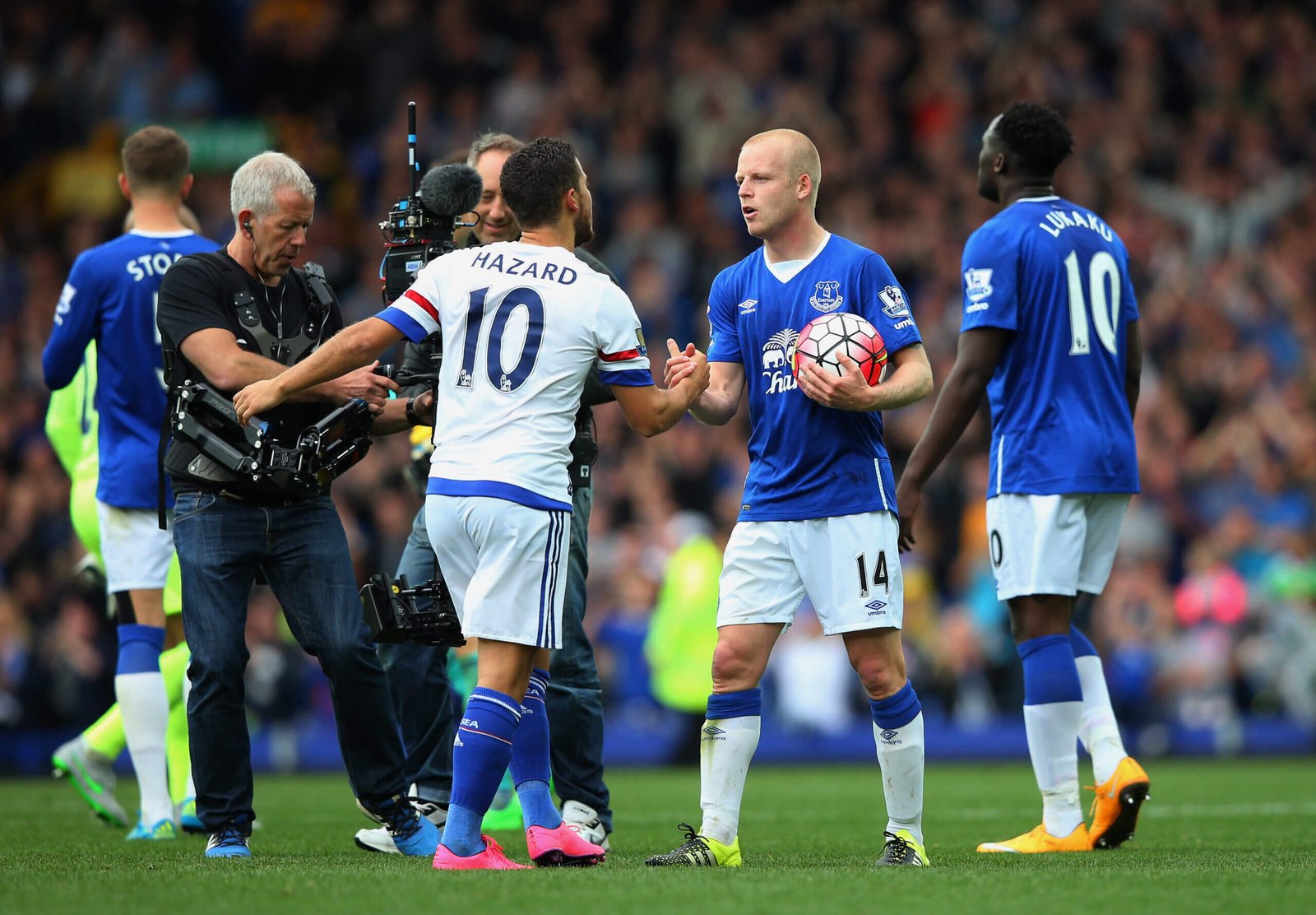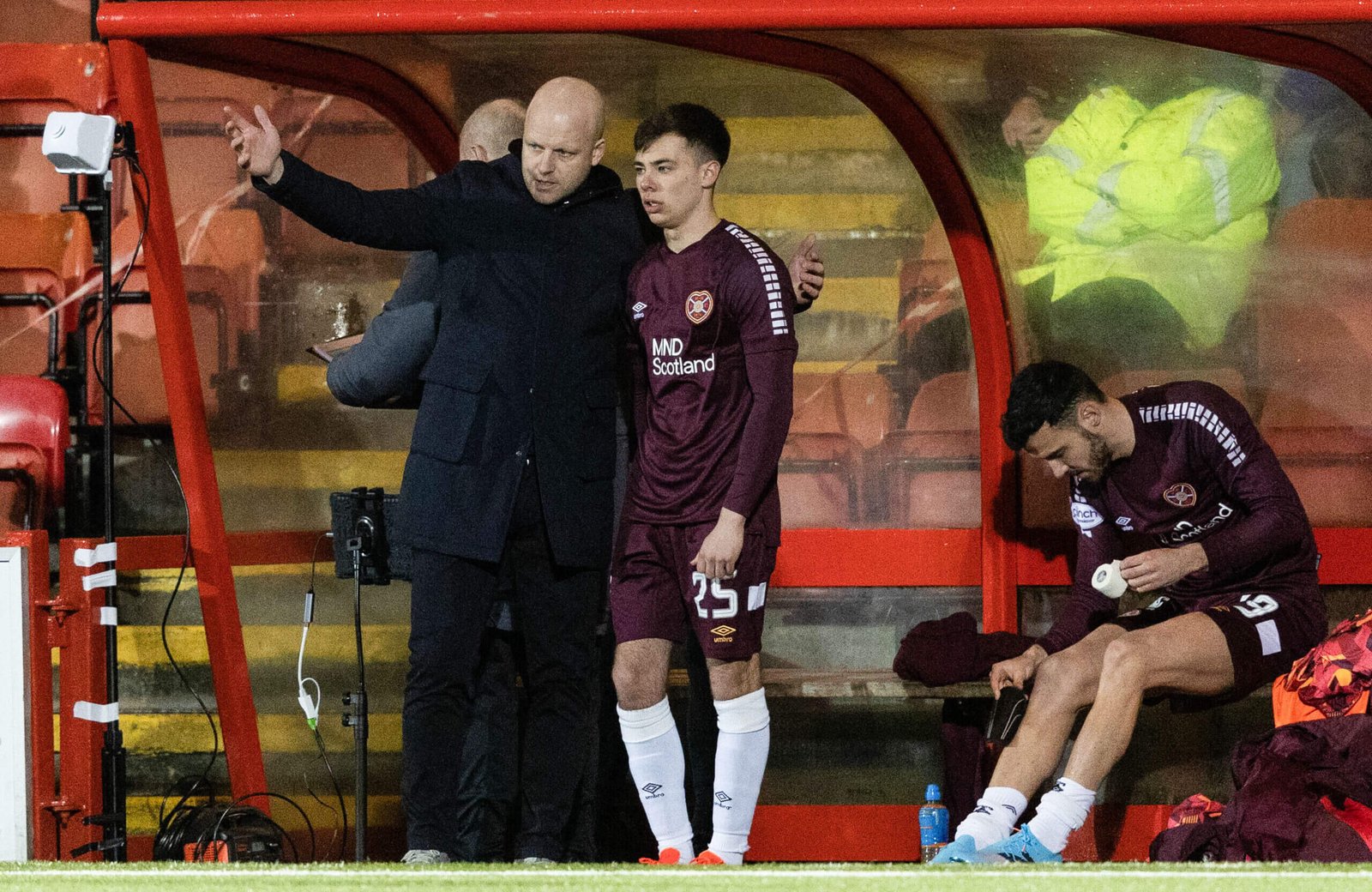Steven Naismith is talking about the start of his tenure as permanent Hearts manager and a testing run that — to some — threatened to derail his progress before it had even properly begun.
By the beginning of September, Hearts had won just one of their opening four league games and missed out on qualification for the Europa Conference League following a defeat against PAOK of Greece.
There were early signs of unrest, with fans venting their frustration after a 1-0 defeat to Motherwell at Tynecastle.
At that stage, Naismith was in the curious position of being under pressure despite not formally holding the title of Hearts manager. The responsibilities behind the scenes had been his, but his lack of a UEFA Pro Licence qualification meant he had to wait until the Edinburgh club had exited European competition before being officially announced.
It proved a challenging backdrop to the former Scotland international’s first season in management. An early sink-or-swim moment from which he emerged intact. Stronger, even.
“It was tough at the start — we lost games,” Naismith, 37, tells The Athletic. “We fell out of Europe, and that’s a really big moment: “Right, are the players going to back you?’ And they did.”
Naismith accepts that his first permanent job in management came “slightly earlier than expected”, but it had been one for which he had been preparing for some time. Since his days at Rangers, he had kept a book of notes — “drills, sessions, things we’d done in games” — offering pointers should he decide to go into coaching.
“It could have been things that managers did with me individually or the way they treated me,” he says. “I’ve noted it all down or I’ve asked the question of the manager, and that probably gave me a good base to go: ‘In my first job, I’m going to do this’.”
As a former Rangers, Everton and Hearts forward, Naismith’s book includes notes from managers of the calibre of Walter Smith, David Moyes and Roberto Martinez.
He has taken elements from all the coaches he has worked under. Jim Jefferies, his manager starting out at Kilmarnock, was “tough as nails and instilled drive”. Smith was a “fantastic” man manager whose “knowledge of the game was brilliant”. Moyes, meanwhile, stuck out for his attention to detail and work ethic.
Moyes instructs Naismith in a 3-3 draw against Aston Villa in February 2013 (Clint Hughes – PA Images via Getty Images)
“Moyesy was similar to Walter,” Naismith says. “Very honest, very straight. He had the respect of everybody. His research was a joke. Our meetings were so long, with so much detail and on each player, style of play.
“His work ethic was the biggest thing. We came off a 14-hour flight in pre-season and the first thing he’s doing is checking the length of the grass on the training pitches. He covered everything.
“He’s the first one that made me think, going into management, the work you need to do is incredible.”
That breadth of knowledge gave Naismith the confidence and belief to stick to his methods in the face of difficult early results. “I saw good bits in the performances. I knew it was going to take time, as we were asking the players to do something different to last season. In a lot of those games, it was one moment or error that cost us. If it was totally going wrong, then you need to adapt.
“I never doubted at one moment and my experiences helped me with that. I was comfortable, as much as there was a lot of pressure from the outside.”
It was Martinez who left the most lasting impression on Naismith as a budding future coach.
The pair remain in touch and it was the current Portugal manager who opened Naismith’s eyes to a different way of playing. “When Roberto came in (at Everton), it was like the opposite end of the spectrum,” he says. “It was expansive.”
“He wasn’t so keen on telling attacking players to get back. Moyesy was always about getting back into structure in a 4-4-2. If you were playing left or right, you needed to work. But Roberto was like: ‘We need you fresh when you get the ball so you can kill teams.’ That was totally different to anything I’d experienced.
“Against Arsenal, he would say: ‘(Mikel) Arteta cannot play forward.’ One of the games, I absolutely smashed Arteta and could have got a red. But I was just making sure he didn’t want the ball.
“He would drill it down to the point of saying, ‘If you need to give up one of the midfielders, it’s (Mathieu) Flamini not Arteta.’ That got me thinking there are some situations where it’s no-win, but it’s about finding the best outcome. I have taken a bit from all these managers, and that has formed how I want to play, how I am as a manager and how I want the environment to be.”

Martinez’s outlook heavily influenced Naismith (Fabrice Coffrini/AFP via Getty Images)
Unsurprisingly, then, Naismith describes his Hearts side as a “possession team”.
“It’s about overloads for me,” he says. “Roberto would risk putting us in very vulnerable positions — I’m probably more reserved than that — but it was about reeling opponents in so we could break the line.
“Formation is a starting point, a reference. The worst thing a player can do is just say: ‘I’m here and that’s it.’ If you’ve got no rotations, no movement, it’s easy to trap you.
“We’ve predominantly played 3-5-2 or 4-2-3-1. But I think you could pause our game at any point and we could be something totally different. That’s how I think the game is going.
“We need to have the freedom that anyone can attack, as long as we cover. We’re not rigid in a structure — there’s a lot of rotation. You could find a striker and our No 10 as sixes and our two wide players as forwards; floating into positions where you’re asking the opposition a question.
“I understand we’ve got better coaches. So these are my principles, my vision, but I’m comfortable enough to have the coaches put them onto the training pitch. Then I’m there to step in.”
Despite their tough start, Hearts are third in the Scottish Premiership, 11 points clear of Kilmarnock in fourth but 18 points behind Rangers and a further three off leaders Celtic.
Competing with the Old Firm is a mammoth task given the disparity in the respective clubs’ resources, but Naismith’s side have kept pace since November.
In their last 24 league games, Rangers have amassed 57 points, Celtic 55 and Hearts 51. Naismith has also got the better of Brendan Rodgers twice this season, although the latest meeting between the two sides last weekend ended in a 3-0 Celtic victory.

Naismith shares the touchline with Rodgers at Celtic Park (Craig Foy/SNS Group via Getty Images)
He accepts challenging the Old Firm throughout a whole season is “still a few years away” but sees “incremental progress” as the best way of closing the gap.
There can be no quick fixes with Hearts, but there is a “bigger buzz out of building something”, much like Moyes did in over a decade at Everton.
“The things that drive me are player progression and winning,” he says. “If a club came in the morning and offered me a massive salary, that’s not what excites me the most.
“People think it’s this unbelievable task to be a footballer, whereas for me my biggest attributes were my hard work, intelligence and learning from mistakes. I’m passing that experience on to make them better.
“The biggest thing is being somewhere that in 20 or 30 years’ time is thriving and I can say I started that. It’s probably looking at what Moyes did at Everton, building them into a Champions League qualifier, which was mental. That takes hard work but it excites me more than anything else.”
The conversation turns to Everton’s travails since Moyes left, with the club now a perennial relegation battler after years of mismanagement.
“All-round bad decisions,” he responds, when asked what has gone wrong. “The biggest thing is recruitment. They’ve let a lot of that 15-20 years of building roots, all the people that are underappreciated at the club who let you know the expectations… that’s drifted, which has fed into the kind of player you’re signing. There wasn’t much thought to any of it.
“One of Moyes’ best things was his recruitment. Picking players from the Championship — (Leighton) Baines, (Phil) Jagielka. Or players from top clubs like Tim Howard (from Manchester United) and getting more out of them, like Martinez did with Gareth Barry.
“It wasn’t just about ability, it was about character. Some of my best memories were at Everton. (Leon) Ossie (Osman) — what a player. Sylvain Distin was the best trainer I’ve seen. When Martinez comes in, he (Distin) is a fish out of water because he’s not a ball player. But every day before training, he came out and played two-touch with us. He looked poor at times but knew he needed to learn.

Naismith is congratulated by Eden Hazard after scoring a hat-trick against Chelsea in 2015 (Alex Livesey/Getty Images)
“Bainesy’s quality was a joke. I used to watch Gareth Barry for England and wondered why he played every game. But then when I played with him… wow. He was a forward’s dream: always on the half-turn, could see a pass. Not fast, but his positioning got him into the right areas.
“If you look at the signings and money that has been spent since, you’re like ‘come on’. They’ve lost the working-class thing. It’s hard to get that feeling and there probably weren’t many better clubs for it. They’ve got a bit at the moment but it’s going to take time to build again. That’s the really sad part.
“It was tough watching them fight relegation over the last few seasons. It’s tough when I listen to people at the club. I watch a lot of the games and have been back quite a few times. I still have great relationships with some of the staff, Seamus (Coleman) and a few others still there. It’s doom and gloom and that’s a hard listen.”
The affinity to Everton is still clear, but the task at hand is Hearts and taking further strides in a nascent coaching career that is showing clear signs of promise.
Naismith is a keen student of the game, watching matches every night after work.
There is admiration for the way his friend and former Everton team-mate John Stones has adapted his game to step into midfield when Manchester City are building from the back, although he wonders how long that trend will continue.
He speaks positively, too, about Brighton’s transition into a side that qualified for Europe under Roberto De Zerbi, Bayer Leverkusen’s play under Xabi Alonso this season and current Tottenham manager Ange Postecoglou’s tenure at Celtic — “It was amazing to see his full-backs inverting and being the No 6s”.
Despite some recent hiccups, Postecoglou is further evidence that pathways are there at the top level for those who excel north of the border.

Naismith instructs Hearts’ Macaulay Tait (Mark Scates/SNS Group via Getty Images)
“In Scotland over the last five to six years, you’ve had Brendan Rodgers, Steven Gerrard and Ange, which does give you that (confidence),” Naismith adds. “But there are loads of young coaches that have been down to England and been in the Championship too.
“The game is becoming so big that you’ll never have an Alex Ferguson going from Aberdeen to Manchester United again. There are so many more layers now. It’s like any job: you make your way up.
“When I was a player, there were a lot of Scottish players who went down to England and were successful. It’s similar now. It’s because of our background and our steeliness. John McGinn, Andy Robertson and Billy Gilmour — all these guys went down with potential and you find your level and work your way up.
“For me, it’s a mindset. We know we’ve got the tools and, if I’m successful here, I know I can go down to England and be successful there.
“I’ve not got (in my head) that I’m going to be a manager and win this and that. Short-term, I want to improve and get better.
“But in a couple of years, I know I’ll have the desire to go as high as I can. My mentality is that I’ll do anything to win.”
(Top photo: Ian MacNicol/Getty Images)
Read the full article here


